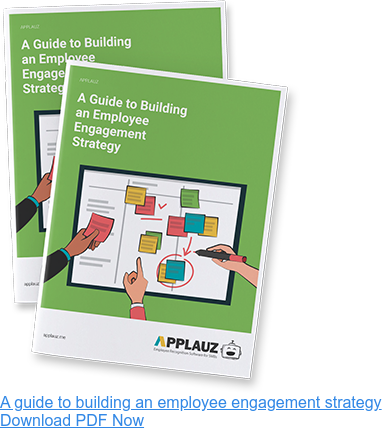While HR professionals tend to be at the forefront of dishing out employee recognition, they are in dire need of appreciation too.
Between the COVID-19 pandemic, the Great Resignation and the continuous employee engagement challenges that organizations are facing, HR teams have had to deal with a lot in the past few years. According to an AllVoices survey, 53% of HR leaders are burned out and 48% of them are looking for a new job. “People leaders are dealing with the challenges of losing employees and hiring new ones while trying to implement new ways to increase engagement and get their employees to stay,” said Claire Schmidt, CEO and founder of AllVoices, in a news release.
Moreover, most people don’t even realize what their HR department actually does. An ADP Canada survey revealed that 39% of respondents don’t know what tasks and responsibilities their HR person or team performs every day. For a lot of people, the first things that come to mind when HR is mentioned are hiring and recruiting as well as payroll and benefits – 37% of those surveyed believe the primary responsibility of HR is the former and 20% of respondents believe it’s the latter.

While this isn’t entirely untrue, HR teams do so much more than that. There are hours of invisible labor that often go unacknowledged – including emotional labor that is easy to take for granted. Plus, in smaller companies, a single HR leader often needs to juggle multiple responsibilities and wear several hats at once.
In other words, if you work in HR, not only have the demands of your job increased and gotten more complicated in the face of job market disruption and a rapidly evolving workplace, but you’re also most likely under-appreciated at work. From culture-building efforts to time spent dealing with compliance management, here are 11 things HR teams do that are underappreciated.
1. They Revise and Update Policies
In today’s business world, company policies aren’t something you come up with once and forget about. They need to be constantly revised and updated, especially when it comes to crucial priorities like Diversity, Equity and Inclusion (DEI) or preventing workplace bullying and harassment. Not to mention the fact that once devised, these policies need to be implemented and enforced. HR teams are often responsible for all that work, which can go unnoticed.
2. They Prevent and Resolve Workplace Conflicts
Conflict resolution is another important HR task that can easily be unacknowledged. Mediating and resolving workplace conflicts requires a lot of emotional intelligence and labor – and it’s a responsibility that can have a huge impact on workplace culture. The thing is, when conflict is handled well, people might never realize there was conflict in the first place. For that reason, HR teams’ role in maintaining harmony and preventing disputes can fly under the radar.
3. They Work Tirelessly to Boost Employee Engagement
Everyone wants to increase employee engagement. That said, it’s a big undertaking that requires buy-in from multiple stakeholders and consistent dedication. HR professionals work relentlessly to boost employee engagement through various strategies and methods. Yet the irony is, their efforts to foster a healthy workplace culture may not be directly appreciated by the satisfied and engaged employees who benefit from it.
4. They Move Mountains to Hire and Recruit Top Talent
The competition for the best talent is fierce. Hiring managers open roles and expect HR to help fill those roles quickly. In reality, hiring and recruiting involve both long-term and short-term tactics. For example, HR teams may implement and launch a new employer branding strategy, create an employee referral program, do outreach, and promote job postings on LinkedIn. They also have to sift through hundreds of resumes and applications and conduct interviews while nurturing a positive candidate experience.
5. They Stay On Top of Compliance Management
Labor laws, regulations, industry standards…staying up to date with it all is a constant challenge for HR teams. It doesn’t sound as exciting as fun employee engagement initiatives, which is why it’s not often recognized or appreciated, but compliance management is a critical HR responsibility.
6. They Make Employee Development a Priority
Employee development isn’t solely an HR responsibility, but HR teams are heavily involved in planning and implementing training and development programs. According to McKinsey, a whopping 87% of companies say that they either already have a skills gap or will have one within a few years. Furthermore, a lack of career development opportunities can drive talent away. HR leaders know that training and development is good for business, but they aren’t always appreciated for their efforts in making it a priority.
7. They Make a Difference With Employee Wellness Programs
You don’t appreciate your employer’s fertility-related benefits until you start trying to have a baby. You glance over the mental health portion of your employee wellness program until a personal crisis leaves you no choice but to seek help. The reality is, the employee wellness programs that HR teams work hard to offer aren’t always fully appreciated until workers use their benefits.
8. They Spend Hours On Data Analysis
Did you know that your HR team makes decisions based on data? The analytical work involved in gathering data and analyzing it is easy to overlook. But those effective HR processes weren’t just created on a whim – they were optimized through intentional data gathering and data-driven decisions.
9. They Leverage Employee Feedback and Surveys
On that note, HR teams often collect data in the form of employee feedback and surveys. These surveys are critical to improving workplace culture, but running them and implementing learnings is a process that requires several iterations and continuous improvements. Unfortunately, the impact of consistent baby steps may not be immediately apparent to employees or other leaders.
10. They Create Seamless Employee Onboarding Experiences
You shouldn’t underestimate the power of a seamless employee onboarding experience – yet many people do just that. Employee onboarding can make or break a new hire’s long-term success, so it’s an HR responsibility that matters a lot, yet may not get shout-outs at the all-hands meeting.
11. They Worry About Staying Ahead of Trends
Staying ahead of trends is another underappreciated task that HR teams undertake. Keeping up with industry best practices and making sure their organization remains competitive is part of the ongoing work of HR professionals. This is also work that happens in parallel with other time-sensitive priorities, such as making sure people get hired and paid. Will it ever get acknowledged? Probably not.

HR teams are the backbone of organizations. Their work supports critical business operations in direct and indirect ways. Unfortunately, it’s not always celebrated in the same way that hitting a sales target would – but it’s just as important. So, don’t forget to cheer on your HR colleagues. They play a big role in implementing employee recognition programs-- but should be getting some recognition as well. That recognition may just be the exact thing that keeps them from looking for other opportunities.
About the author
Anouare Abdou
Anouare Abdou is a seasoned HR and business writer passionate about leadership, productivity, and the future of work. Her words have appeared in Business Insider, The Ladders, Thrive Global and more.



